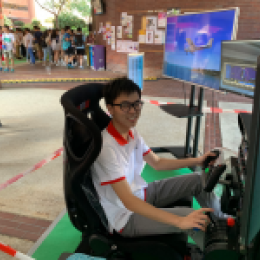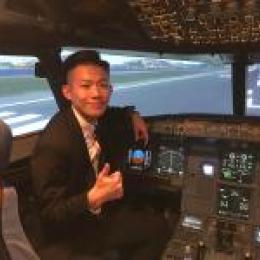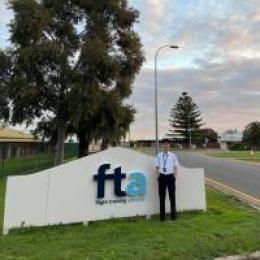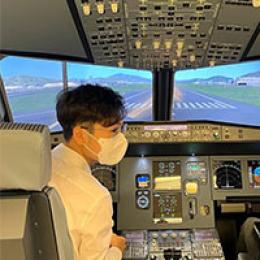Sept 2024 Entry
4 years
124 (plus 10 training credits)
Note: The individual credits required may vary depending on the academic background of the student.
Scheme Leader
Dr K.H. NG
B.Sc., Ph.D., MIEEE, MIET, AIAA, MRAeS, FHKMetS
Programme Leader – BEng (Hons) in Aviation Engineering
Dr Xi SHEN
B.Eng., Ph.D.
Programme Leader – BEng (Hons) in Air Transport Engineering
Dr Gangyan XU
B.Eng., B.B.A, M.Eng., Ph.D.
The Bachelor of Engineering (Honours) Scheme in Aviation Engineering includes the following two awards:
BEng (Hons) in Aviation Engineering
BEng (Hons) in Air Transport Engineering
The credit requirements of this scheme are indicative only. They are subject to review.
Students are allowed to enrol in any award programme without being subject to further assessment.
Deferred Choice between BEng (Hons) in Aviation Engineering and BEng (Hons) in Air Transport Engineering
Students who are admitted to the Scheme study together during the first two years and then pursue their preferred programmes, normally within the next two years, until graduation. This arrangement enables students to choose their study path once they have obtained a solid understanding of the programmes during the first two years.
Admission to BEng (Hons) in Aviation Engineering or BEng (Hons) in Air Transport Engineering
Students who wish to enrol in either the BEng (Hons) in Aviation Engineering or the BEng (Hons) in Air Transport Engineering programme should apply for admission to the BEng (Hons) Scheme in Aviation Engineering.
What's New
Programme Aims
BEng (Hons) in Aviation Engineering
This programme aims to equip highly skilled graduates with:
-
In-depth understanding of aviation and aeronautical engineering systems and up-to-date technologies, as well as specialised knowledge in a chosen stream of study.
-
Competence to handle various engineering problems academically and practically in the aviation and aeronautical industry.
-
Sufficient knowledge to manage and solve problems through effective and efficient project management and planning.
-
Skills to communicate effectively with various stakeholders using state-of-the art technologies and aviation and aeronautical languages in both English and Chinese.
BEng (Hons) in Air Transport Engineering
This programme aims to equip highly skilled graduates with:
-
In-depth understanding of air transport operations, resource planning, human-centred design of aviation systems and airworthiness and up-to-date technologies, as well as specialised knowledge in a chosen stream of study.
-
Competence to handle different engineering problems practically and academically in the aviation industry.
-
Sufficient knowledge and skills to effectively and efficiently manage various projects related to the aviation sector.
-
Skills to communicate effectively with various stakeholders by using state-of-the-art technologies and aviation languages in both English and Chinese.
Programme Characteristics
The Aviation Engineering Scheme aims to train students to become aeronautical and aviation engineers who possess strong skills in and in-depth knowledge of engineering and engineering management, as well as a sense of social and environmental responsibility.
BEng (Hons) in Aviation Engineering
Graduates are equipped to pursue careers in aircraft maintenance engineering, aircraft component engineering, aeronautical engineering, aircraft design, control and propulsion systems, navigation, unmanned aerial vehicles and many other engineering disciplines. The programme provides hands-on experience with the support of state-of-the-art facilities, such as supersonic wind tunnels, UAV testing systems and material manufacturing and testing platforms.
BEng (Hons) in Air Transport Engineering
Graduates are equipped to pursue careers in air transport engineering, airport/airline operations and management, aviation safety, air logistics and supply chain management, and human factors engineering. The programme provides hands-on experience with the support of state-of-the-art facilities, such as the Cockpitsonic A320 FTD flight simulator, Cessna flight simulator, avionic systems and human factors equipment.
Professional Recognition
The BEng (Hons) in Aviation Engineering and BEng (Hons) in Air Transport Engineering programmes have been granted full accreditation by the Hong Kong Institution of Engineers (HKIE).
Career Prospects
Graduates will be equipped to seek employment in professional aircraft maintenance engineering and pilot training sectors. Some of our AAE graduates pursue Master’s or doctoral degrees at local or overseas universities based on their interests and career aspirations.
BEng (Hons) in Aviation Engineering
Graduates of BEng (Hons) in Aviation Engineering can pursue careers in various areas of aviation engineering, such as aircraft maintenance engineering, aeronautical engineering, aircraft design and control and propulsion systems. They also have extensive opportunities to join the public and private aviation technology and R&D sectors.
BEng (Hons) in Air Transport Engineering
Graduates of BEng (Hons) in Air Transport Engineering can pursue careers in various areas of air transport engineering, including airline/airport operations, flight standards and airworthiness, aviation safety and reliability, air transport and supply chain management, and human factors engineering. They also have extensive opportunities to join the public and private aviation technology and R&D sectors.
The 124 academic credits required consist of 30 mandatory credits of General University Requirements (GUR) and 94 credits of Discipline-Specific Requirements (DSR).
BEng (Hons) in Aviation Engineering
First Study Year
The first-year curriculum is common to both programmes. Students receive a broad education in mathematics and science and learn about the role and responsibilities of an engineer. Together with two introductory subjects on aircraft and aviation systems, this arrangement provides students with a strong foundation for their continued study of aviation engineering.
Second Study Year
The second-year curriculum is common to both programmes. Students acquire knowledge of materials, mechanics and electrical and electronics engineering issues that are fundamental to aircraft and aviation systems. In addition, students gain hands-on experience of aircraft component manufacturing and maintenance.
Third Study Year
The third-year curriculum provides students with more advanced knowledge of aircraft structure and materials, aerodynamics, propulsion, aircraft dynamics, and control and avionics. This strengthens their core knowledge base and supports their further study.
Final Study Year
Students can apply their skills and knowledge in a final-year project to further develop their professional engineering skills. Each student can choose a topic that interests them, such as unmanned aerial vehicles, avionics or aircraft design. They can also choose to focus on a desired elective stream to acquire specialised knowledge.
BEng (Hons) in Air Transport Engineering
First Study Year
The first-year curriculum is common to both programmes. Students receive a broad education in mathematics and science and learn about the role and responsibilities of an engineer. Together with two introductory subjects on aircraft and aviation systems, this arrangement provides students with a strong foundation for their continued study of aviation engineering.
Second Study Year
The second-year curriculum is common to both programmes. Students acquire knowledge of materials, mechanics, and electrical and electronics engineering that are fundamental to aircraft and aviation systems. In addition, students gain hands-on experience of aircraft component manufacturing and maintenance.
Third Study Year
Students first build up their core knowledge of aviation safety, reliability, aircraft performance, flight management, airport services engineering, airline operations and human factors engineering. This gives them a solid understanding of aviation and furthers their pursuit of a specialised stream of study.
Final Study Year
Students can apply their skills and knowledge in a final-year project on operations research, airworthiness and regulation, or aviation project management to build up their professional engineering skills. They can also focus on a desired elective stream to acquire specialised knowledge.
Stream study for BEng (Hons) in Aviation Engineering and BEng (Hons) in Air Transport Engineering
Students can choose to pursue one of the following study streams:
- Aeronautical Engineering
- Aviation Services Engineering
- Aircraft Maintenance Engineering*
* Students who opt for the HKAR-147 Aircraft Maintenance Engineer Training (for HKAR-66 Cat. B1.1 Aircraft Maintenance license) are required to choose the Aircraft Maintenance Engineering stream. The professional aircraft maintenance training option conducted in accordance with the HKAR-147 (for the HKAR-66 Cat. B1.1 Aircraft Maintenance License) is available to students enrolled on both programmes with an additional training fee.
Other Learning Experiences
Summer internships, industry visits, on-site experience sharing and industrial training are arranged to complement classroom teaching and enhance students’ learning and industry experience in the fields of aeronautics and aviation. Industrial training is provided by the PolyU Industrial Centre.
Work-Integrated Education
Students are required to undertake at least two weeks of full-time WIE in a suitable organisation before graduation.
Satisfy the University's General Entrance Requirements.
Please click here for the subject weightings for 2024/25.
There is no compulsory subject requirement. Preferred subject(s) with the highest weighting for admission score calculation include(s):
2023/24 Average Score: Any Best 5 Subjects (with Subject Weighting) = 197.4
For further programme information, please contact
the General Office (tel.: 3400 2489; email: aae.info@polyu.edu.hk).
Transcript with all subject grades and the latest Cumulative GPA shown is required.
Click here
To evaluate the potential of applicants for admission to the programme, and to examine their communication skills and interest in the field of studies.
About 10 - 15 minutes
Suitable applicants may be invited for interviews.
Transcript with all subject grades and the latest Cumulative GPA shown is required.
Click here
To evaluate the potential of applicants for admission to the programme, and to examine their communication skills and interest in the field of study.
About 10-15 minutes.
Suitable applicants may be invited for interview.












